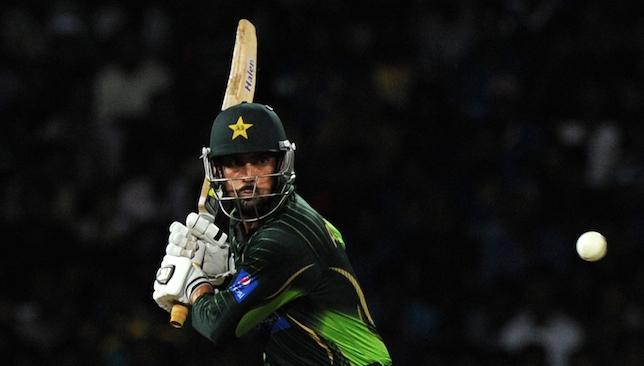
Humble beginnings, a spell in the spotlight followed by a period of obscurity and back in reckoning – all-rounder Anwar Ali has seen it all in his fledgling cricket career. And he is now keen to seal a regular spot in the Pakistan national team.
Ali, who used to work in a factory ironing socks, became a YouTube sensation after a devastating bowling display in the 2006 Under-19 World Cup final against India. The 19-year-old’s brilliant swing bowling (5-35) helped Pakistan lift the title in a low-scoring game but he failed to translate that success with the senior team.
A fantastic one-day international debut (43 not out off 55 balls and 2-24) marked him out for greater deeds but since then, such displays have been few and far between. However, his heroics in the Twenty20 international that turned the tables on Sri Lanka last month has brought the spotlight back on him.
His belligerent 17-ball 46 that included four sixes and three boundaries fetched him the Man of the Match award as Pakistan, chasing 173, overcame a slump (40-5) to record a sensational victory at the Premadasa Stadium. He also smacked Sri Lankan captain Lasith Malinga for a six and a four in successive balls and later famously remarked: “I was watching the ball not the bowler.”
Ali’s display prompted comparisons with Shahid Afridi’s knock (34 not out off 18 balls) against India in the 2014 Asia Cup and Abdur Razzaq’s century (109 not out off 72 balls) against South Africa in 2010. Before that gallant display, Ali was considered an average player who only got a place in the side because of star all-rounder Afridi’s backing.
But all that looks to change as Pakistan welcomed the 27-year-old back into the fold and he is keen to continue producing such displays with both bat and ball. “I hope that I will be able to continue performing well for Pakistan in the future as well because nothing is better than to be regarded as a match-winner,” Ali said. “The reception I’ve got at home has been amazing.”
– FEATURE: How Bangladesh are building to take on cricket’s elite
– Viv Richards – Clarke should not be remembered for Ashes loss
– #360stats: A history of the Test rivalry between Sri Lanka and India
– SLvIND: Sri Lanka pull off remarkable turnaround to win first Test
Back in that Under-19 World Cup final in 2006, which was coincidentally also held at the Premadasa, Ali rattled an India team containing the likes of Rohit Sharma and Cheteshwar Pujara with his bowling. But when he met Sharma again in 2012, the predicted ascent to the top had not materialised.
“When I went on a tour of India in 2012, Rohit Sharma asked me where I had vanished. He told me that he and his fellow players talk highly about me but I never performed as well as I did at the U19 World Cup,” he recalls. Ali feels the Sri Lankan venue holds a special place for him. “Both wins are really memorable for me because one helped me get noticed while the other has resurrected my career. The first performance came with the ball while the recent one with the bat.”
Ali has lost the swing and seam movement due to technical adjustments in his action, with a rib injury playing its part too. He possessed a deadly inswinger but was asked to develop a good outswinger as well, which resulted him being deprived of his most potent weapon. But the all-rounder has not lost heart and says that he is working hard with Pakistan head coach Waqar Younis to regain that touch.
He also thanks Pakistan’s 1992 World Cup winner Aaqib Javed, who is now head coach of the UAE national team, for helping him out initially in his career.
“When I was selected in the Pakistan U19 camp and went to National Cricket Academy in Lahore, Aaqib looked after me because I was a poor guy at that time. He gave me his own adidas spikes and those were the first pair of spikes I wore. Aaqib had played few international matches with them so it was really kind of him,” he recalled.
“It was Aaqib who told me first that I could become an all-rounder and really worked on improving my overall game whenever he had the chance to work with me. I can say that he has played a big part in my career. Currently, my captains Afridi and Azhar Ali are backing me a lot while team management has boosted my confidence.”
For a player who used to work in a garment factory in double shifts of up to 16 hours a day in Banaras (Karachi) earning a mere Rs4000 (Dh144) per month, it has been an incredible journey.
“The key is to not forget your past and that has really helped me to strive for bigger dreams and remain humble,” Ali said as he aims to achieve big things in cricket.